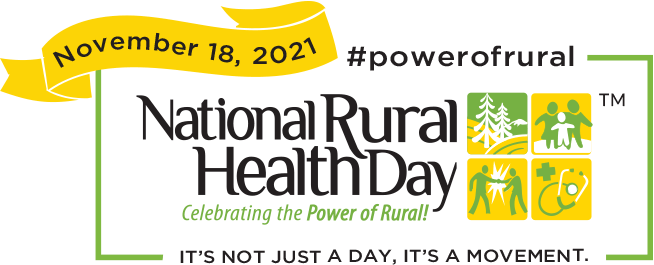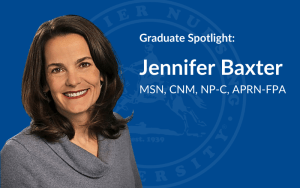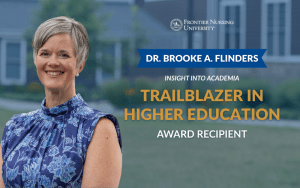 On Thursday, November 18, Frontier Nursing University (FNU) will join healthcare providers and organizations across the country to celebrate the “Power of Rural” on National Rural Health Day (NRHD). Organized by the National Organization of State Offices of Rural Health, NRHD is an opportunity to bring awareness to the unique challenges that rural communities face and the efforts of rural healthcare providers to create positive change in these regions.
On Thursday, November 18, Frontier Nursing University (FNU) will join healthcare providers and organizations across the country to celebrate the “Power of Rural” on National Rural Health Day (NRHD). Organized by the National Organization of State Offices of Rural Health, NRHD is an opportunity to bring awareness to the unique challenges that rural communities face and the efforts of rural healthcare providers to create positive change in these regions.
Founded in the Appalachian area of Kentucky, serving rural communities has always been at the heart of Frontier. FNU strives to provide accessible nurse-midwifery and nurse practitioner education to leaders in primary care to serve all individuals, with an emphasis on women and families in diverse, rural, and underserved populations. Today, 73 percent of FNU students live and complete their clinics in rural areas throughout the United States, including various regions of Alaska, Montana, Oklahoma, and Kentucky.
Throughout the year, FNU shares inspiring stories on its blog about the impact alumni, students and preceptors have on rural communities. As we celebrate NRHD, here are some ways the Frontier community is paving the way for better health conditions in these often underserved regions.
For the past 13 years, Sims has worked in rural South Carolina, helping patients at the Medical University of South Carolina’s Primary Care Center in Great Falls. The rural town of Great Falls once had a thriving economy but has fallen on hard times in recent years due to the closing of a cotton mill. Like many rural areas, Great Falls faces poverty, lack of healthcare education and the need for a complete spectrum of healthcare. Sims hosts up to three preceptors at a time and sees up to 40 patients a day; however, according to those who have studied under him, Sims always takes the time to provide genuine, personalized care to everyone he treats. He also puts his preceptor students at ease with jokes and casual quizzing throughout the day.
“I am forever thankful that Terry will always be my mentor,” Alice Dalena, one of his precepting students, said after finishing her Clinical Practicum with Sims.
Alumni Patty Coldiron, MSN, FNP
Born and raised in rural Harlan County, Ky., Coldiron dropped out of high school at the age of 16 to give birth to her son Joshua, born with spina bifida. Joshua’s condition, and her connection to her homeland, led Coldiron on a journey to improve healthcare in her community. Throughout the past 20 years, Coldiron has worked across the healthcare field as a certified nursing assistant, an ER nurse, and a home health specialist. She earned a master’s degree as a family nurse practitioner from FNU in 2015. In January of this year, Coldiron opened Hometown Urgent Care to meet the gap in care in Harlan County.
“My community had never had an urgent care medical center, and I knew from working in the ER that these were services we desperately needed in Harlan County,” Coldiron said.
Coldiron’s clinic operates daily from 10 a.m. to 8 p.m. to help make healthcare a feasible option for working families, a model that she plans on expanding. Coldiron hopes to open more Hometown Urgent Care clinics in other rural areas where citizens rely on emergency rooms for minor and urgent illnesses. She knows that accessible healthcare is key to helping communities like Harlan County thrive.
Alumni Marli Parobek, DNP, MS, APRN, FNP-C, PMHNP-C
After working a dozen years as a nurse practitioner in Yakima, Wash., Parobek decided to take her career to the next level to meet a growing need for mental health services in her hometown. Becoming a Psychiatric-Mental Health Nurse Practitioner (PMHNP) and earning a Doctor of Nursing Practice degree from FNU, Parobek now serves the mental health needs of her community, composed of predominantly blue-collar workers and minority races facing poverty and substance abuse struggles.
Parobek is currently head of the inpatient psychiatric unit at Astria Toppenish Hospital, where her focus is on voluntary and involuntary inpatient psychiatry, medical withdrawal and detox. The voluntary detox program for alcohol and opiate addicts is 3-5 days of 24/7 nursing care in the hospital. Parobek’s role is to prescribe detox medications and perform psychiatric evaluations for these patients until they are discharged to outpatient programs. Marli and the Astria psychiatric unit received federal and state grants to implement their programs, offering vital services that had previously not existed in eastern Washington.
Serving as the only nurse practitioner at the Front Street Clinic in downtown Juneau, Alaska, David Moore is dedicated to bringing a better quality of life to the people of his rural town. Moore is joined by a registered nurse, two behavioral health specialists, and two case managers at his clinic. Most of his patients are homeless and medically underserved, with many battling chronic illnesses.
“Most of the people we see aren’t coming in to be treated for a cold. The majority of our patients are present with chronic illness, and they’re transient, so we only see them when some crisis arises,” Moore said.
Although his patient load can undoubtedly be challenging, Moore credits FNU for helping to cultivate his desire to serve in rural areas and helping him to think outside of the box.
“The way the FNU nurse practitioner program is designed, I had to be independent and dig for resources,” Moore said. “FNU taught me to go above and beyond to get the job done.”
The Frontier community is proud to develop healthcare leaders in rural America. When modern resources are provided to underserved areas, our country grows closer to reaching a more equitable healthcare system with brighter futures for so many.
Join us in celebrating the value of rural communities and help shine a light on the health disparities facing these regions by sharing information about NRHD with your friends, colleagues, and social media followers. Visit the NRHD site to find ideas and resources. Until all of America has access to quality healthcare, there is work to be done!






















 Carrie Belin is an experienced board-certified Family Nurse Practitioner and a graduate of the Johns Hopkins DNP program, Johns Hopkins Bloomberg School of Public Health, Georgetown University School of Nursing, and Johns Hopkins School of Nursing. She has also completed fellowships at Georgetown and the University of California Irvine.
Carrie Belin is an experienced board-certified Family Nurse Practitioner and a graduate of the Johns Hopkins DNP program, Johns Hopkins Bloomberg School of Public Health, Georgetown University School of Nursing, and Johns Hopkins School of Nursing. She has also completed fellowships at Georgetown and the University of California Irvine. Angie has been a full-scope midwife since 2009. She has experience in various birth settings including home, hospital, and birth centers. She is committed to integrating the midwifery model of care in the US. She completed her master’s degree in nurse-midwifery at Frontier Nursing University (FNU) and her Doctorate at Johns Hopkins University. She currently serves as the midwifery clinical faculty at FNU. Angie is motivated by the desire to improve the quality of healthcare and has led quality improvement projects on skin-to-skin implementation, labor induction, and improving transfer of care practices between hospital and community midwives. In 2017, she created a short film on skin-to-skin called
Angie has been a full-scope midwife since 2009. She has experience in various birth settings including home, hospital, and birth centers. She is committed to integrating the midwifery model of care in the US. She completed her master’s degree in nurse-midwifery at Frontier Nursing University (FNU) and her Doctorate at Johns Hopkins University. She currently serves as the midwifery clinical faculty at FNU. Angie is motivated by the desire to improve the quality of healthcare and has led quality improvement projects on skin-to-skin implementation, labor induction, and improving transfer of care practices between hospital and community midwives. In 2017, she created a short film on skin-to-skin called 










 Justin C. Daily, BSN, RN, has ten years of experience in nursing. At the start of his nursing career, Justin worked as a floor nurse on the oncology floor at St. Francis. He then spent two years as the Director of Nursing in a small rural Kansas hospital before returning to St. Francis and the oncology unit. He has been in his current position as the Chemo Nurse Educator for the past four years. He earned an Associate in Nurse from Hutchinson Community College and a Bachelor of Science in Nursing from Bethel College.
Justin C. Daily, BSN, RN, has ten years of experience in nursing. At the start of his nursing career, Justin worked as a floor nurse on the oncology floor at St. Francis. He then spent two years as the Director of Nursing in a small rural Kansas hospital before returning to St. Francis and the oncology unit. He has been in his current position as the Chemo Nurse Educator for the past four years. He earned an Associate in Nurse from Hutchinson Community College and a Bachelor of Science in Nursing from Bethel College. Brandy Jackson serves as the Director of Undergraduate Nursing Programs and Assistant Educator at Wichita State University and Co-Director of Access in Nursing. Brandy is a seasoned educator with over 15 years of experience. Before entering academia, Brandy served in Hospital-based leadership and Critical Care Staff nurse roles. Brandy is passionate about equity in nursing education with a focus on individuals with disabilities. Her current research interests include accommodations of nursing students with disabilities in clinical learning environments and breaking down barriers for historically unrepresented individuals to enter the nursing profession. Brandy is also actively engaged in Interprofessional Education development, creating IPE opportunities for faculty and students at Wichita State. Brandy is an active member of Wichita Women for Good and Soroptimist, with the goal to empower women and girls. Brandy is a TeamSTEPPS master trainer. She received the DASIY Award for Extraordinary Nursing Faculty in 2019 at Wichita State University.
Brandy Jackson serves as the Director of Undergraduate Nursing Programs and Assistant Educator at Wichita State University and Co-Director of Access in Nursing. Brandy is a seasoned educator with over 15 years of experience. Before entering academia, Brandy served in Hospital-based leadership and Critical Care Staff nurse roles. Brandy is passionate about equity in nursing education with a focus on individuals with disabilities. Her current research interests include accommodations of nursing students with disabilities in clinical learning environments and breaking down barriers for historically unrepresented individuals to enter the nursing profession. Brandy is also actively engaged in Interprofessional Education development, creating IPE opportunities for faculty and students at Wichita State. Brandy is an active member of Wichita Women for Good and Soroptimist, with the goal to empower women and girls. Brandy is a TeamSTEPPS master trainer. She received the DASIY Award for Extraordinary Nursing Faculty in 2019 at Wichita State University.  Dr. Sabrina Ali Jamal-Eddine is an Arab-disabled queer woman of color with a PhD in Nursing and an interdisciplinary certificate in Disability Ethics from the University of Illinois Chicago (UIC). Dr. Jamal-Eddine’s doctoral research explored spoken word poetry as a form of critical narrative pedagogy to educate nursing students about disability, ableism, and disability justice. Dr. Jamal-Eddine now serves as a Postdoctoral Research Associate in UIC’s Department of Disability and Human Development and serves on the Board of Directors of the National Organization of Nurses with Disabilities (NOND). During her doctoral program, Sabrina served as a Summer Fellow at a residential National Endowment of the Humanities (NEH) Summer Institute at Arizona State University (2023), a summer fellow at Andrew W. Mellon’s National Humanities Without Walls program at University of Michigan (2022), a Summer Research Fellow at UC Berkeley’s Othering & Belonging Institute (2021), and an Illinois Leadership Education in Neurodevelopmental and related Disabilities (LEND) trainee (2019-2020).
Dr. Sabrina Ali Jamal-Eddine is an Arab-disabled queer woman of color with a PhD in Nursing and an interdisciplinary certificate in Disability Ethics from the University of Illinois Chicago (UIC). Dr. Jamal-Eddine’s doctoral research explored spoken word poetry as a form of critical narrative pedagogy to educate nursing students about disability, ableism, and disability justice. Dr. Jamal-Eddine now serves as a Postdoctoral Research Associate in UIC’s Department of Disability and Human Development and serves on the Board of Directors of the National Organization of Nurses with Disabilities (NOND). During her doctoral program, Sabrina served as a Summer Fellow at a residential National Endowment of the Humanities (NEH) Summer Institute at Arizona State University (2023), a summer fellow at Andrew W. Mellon’s National Humanities Without Walls program at University of Michigan (2022), a Summer Research Fellow at UC Berkeley’s Othering & Belonging Institute (2021), and an Illinois Leadership Education in Neurodevelopmental and related Disabilities (LEND) trainee (2019-2020). Vanessa Cameron works for Vanderbilt University Medical Center in Nursing Education & Professional Development. She is also attending George Washington University and progressing towards a PhD in Nursing with an emphasis on ableism in nursing. After becoming disabled in April 2021, Vanessa’s worldview and perspective changed, and a recognition of the ableism present within healthcare and within the culture of nursing was apparent. She has been working since that time to provide educational foundations for nurses about disability and ableism, provide support for fellow disabled nursing colleagues, and advocate for the disabled community within healthcare settings to reduce disparities.
Vanessa Cameron works for Vanderbilt University Medical Center in Nursing Education & Professional Development. She is also attending George Washington University and progressing towards a PhD in Nursing with an emphasis on ableism in nursing. After becoming disabled in April 2021, Vanessa’s worldview and perspective changed, and a recognition of the ableism present within healthcare and within the culture of nursing was apparent. She has been working since that time to provide educational foundations for nurses about disability and ableism, provide support for fellow disabled nursing colleagues, and advocate for the disabled community within healthcare settings to reduce disparities. Dr. Lucinda Canty is a certified nurse-midwife, Associate Professor of Nursing, and Director of the Seedworks Health Equity in Nursing Program at the University of Massachusetts Amherst. She earned a bachelor’s degree in nursing from Columbia University, a master’s degree from Yale University, specializing in nurse-midwifery, and a PhD from the University of Connecticut. Dr. Canty has provided reproductive health care for over 29 years. Her research interests include the prevention of maternal mortality and severe maternal morbidity, reducing racial and ethnic health disparities in reproductive health, promoting diversity in nursing, and eliminating racism in nursing and midwifery.
Dr. Lucinda Canty is a certified nurse-midwife, Associate Professor of Nursing, and Director of the Seedworks Health Equity in Nursing Program at the University of Massachusetts Amherst. She earned a bachelor’s degree in nursing from Columbia University, a master’s degree from Yale University, specializing in nurse-midwifery, and a PhD from the University of Connecticut. Dr. Canty has provided reproductive health care for over 29 years. Her research interests include the prevention of maternal mortality and severe maternal morbidity, reducing racial and ethnic health disparities in reproductive health, promoting diversity in nursing, and eliminating racism in nursing and midwifery. Dr. Lisa Meeks is a distinguished scholar and leader whose unwavering commitment to inclusivity and excellence has significantly influenced the landscape of health professions education and accessibility. She is the founder and executive director of the DocsWithDisabilities Initiative and holds appointments as an Associate Professor in the Departments of Learning Health Sciences and Family Medicine at the University of Michigan.
Dr. Lisa Meeks is a distinguished scholar and leader whose unwavering commitment to inclusivity and excellence has significantly influenced the landscape of health professions education and accessibility. She is the founder and executive director of the DocsWithDisabilities Initiative and holds appointments as an Associate Professor in the Departments of Learning Health Sciences and Family Medicine at the University of Michigan. Dr. Nikia Grayson, DNP, MSN, MPH, MA, CNM, FNP-C, FACNM (she/her) is a trailblazing force in reproductive justice, blending her expertise as a public health activist, anthropologist, and family nurse-midwife to champion the rights and health of underserved communities. Graduating with distinction from Howard University, Nikia holds a bachelor’s degree in communications and a master’s degree in public health. Her academic journey also led her to the University of Memphis, where she earned a master’s in medical anthropology, and the University of Tennessee, where she achieved both a master’s in nursing and a doctorate in nursing practice. Complementing her extensive education, she completed a post-master’s certificate in midwifery at Frontier Nursing University.
Dr. Nikia Grayson, DNP, MSN, MPH, MA, CNM, FNP-C, FACNM (she/her) is a trailblazing force in reproductive justice, blending her expertise as a public health activist, anthropologist, and family nurse-midwife to champion the rights and health of underserved communities. Graduating with distinction from Howard University, Nikia holds a bachelor’s degree in communications and a master’s degree in public health. Her academic journey also led her to the University of Memphis, where she earned a master’s in medical anthropology, and the University of Tennessee, where she achieved both a master’s in nursing and a doctorate in nursing practice. Complementing her extensive education, she completed a post-master’s certificate in midwifery at Frontier Nursing University.









 Dr. Tia Brown McNair is the Vice President in the Office of Diversity, Equity, and Student Success and Executive Director for the Truth, Racial Healing, and Transformation (TRHT) Campus Centers at the American Association of Colleges and Universities (AAC&U) in Washington, DC. She oversees both funded projects and AAC&U’s continuing programs on equity, inclusive excellence, high-impact practices, and student success. McNair directs AAC&U’s Summer Institutes on High-Impact Practices and Student Success, and TRHT Campus Centers and serves as the project director for several AAC&U initiatives, including the development of a TRHT-focused campus climate toolkit. She is the lead author of From Equity Talk to Equity Walk: Expanding Practitioner Knowledge for Racial Justice in Higher Education (January 2020) and Becoming a Student-Ready College: A New Culture of Leadership for Student Success (July 2016 and August 2022 Second edition).
Dr. Tia Brown McNair is the Vice President in the Office of Diversity, Equity, and Student Success and Executive Director for the Truth, Racial Healing, and Transformation (TRHT) Campus Centers at the American Association of Colleges and Universities (AAC&U) in Washington, DC. She oversees both funded projects and AAC&U’s continuing programs on equity, inclusive excellence, high-impact practices, and student success. McNair directs AAC&U’s Summer Institutes on High-Impact Practices and Student Success, and TRHT Campus Centers and serves as the project director for several AAC&U initiatives, including the development of a TRHT-focused campus climate toolkit. She is the lead author of From Equity Talk to Equity Walk: Expanding Practitioner Knowledge for Racial Justice in Higher Education (January 2020) and Becoming a Student-Ready College: A New Culture of Leadership for Student Success (July 2016 and August 2022 Second edition).